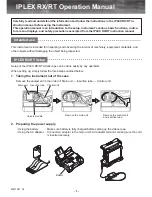
3
C861 • C862 • C863 • C864 • C868
C861 • C862 • C863 • C864 • C868
4
pH measurement
1.
Select the desired input, e.g. [CH.1], by pressing
MODE
. The display will imme-
diately show the measured value according to the previous calibration. Should
you want to recalibrate, press
CAL
.
2.
The display shows five of the 9 buffers in memory (1.68, 4.00, 4.01, 6.87, 7.00,
9.18, 9.21, 10.01, 12.45). Select the proper values or enter manually special
values and press
CAL
.
The unused buffers should be switched off.
3
. Rinse the electrodes with distilled water and immerse them in the first buffer
solution. Select [CALIBRATE], press
CAL
and follow the instructions on the
screen until the calibration is finished.
4.
After rinsing the electrodes with distilled water, immerse them in the samples
and read the display.
5.
Rinse the electrodes always with distilled water after use and store them in a
3...4 M KCl solution.
Using pH electrodes with an abnormal zero point:
1.
Select [E0 = x mV] and press
CAL
.
2.
Enter the zero point of the electrode and press
CAL
.
• Press
ê
to change the resolution from 0.1 to 0.001 pH.
Temperature measurement
1.
Select [°C] by pressing
MODE
. Without Pt1000, adjust the manual temperature
compensation and proceed by pressing
MODE
. Should you want to recalibrate,
press
CAL
.
2
. Immerse the Pt1000 in a standard solution of known temperature. Calibrate to
the proper value and press
CAL
. Press
Hold
to reset the calibration.
mV measurement
1.
Select the desired input, e.g. [CH.2], by pressing
MODE
. The display will imme-
diately show the measured value according to the previous calibration. Should
you want to recalibrate, press
CAL
.
2
. Immerse the electrodes in a standard solution of known potential, adjust to
the proper value and press
CAL
. Press
Hold
to reset the calibration.
• Press
ê
to change the resolution from 1 to 0.1 mV.
rH
2
measurement
1.
Select [rH
2
] by pressing
MODE
.
2.
After calibrating and rinsing the pH and redox electrodes with distilled water,
immerse them in the solution to be measured and read the display.
Important
• A blinking decimal point warns you for unstable measurements. Wait to read
the display!
• Stirring the solution during the measurements promotes the homogeneity and
is obligatory!
• The instrument will refuse automatic calibration when the electrode is unsta-
ble. Insufficient stirring or a worn electrode may be the cause.
(C868)
Summary of Contents for C861
Page 1: ...C861 C862 C863 C864 C868 December 2008 Consort MANUAL HANDLEIDING MODE D EMPLOI ANLEITUNG...
Page 38: ......
Page 39: ......







































